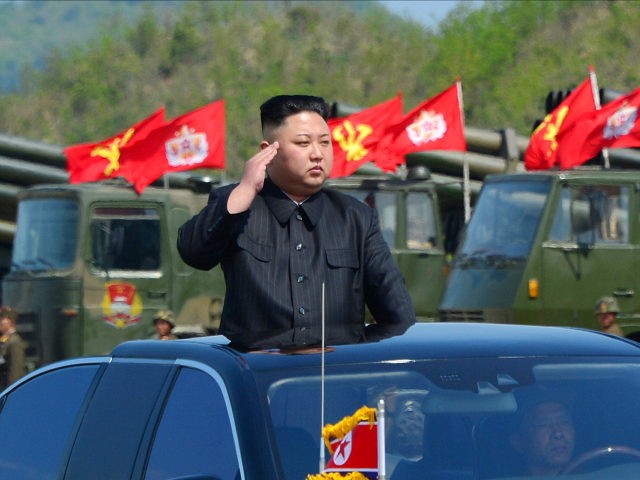Communist North Korean dictator Kim Jong-un told his Workers’ Party in a meeting Sunday to “bolster up the overall armed forces” in light of tensions with the United States, shortly before Pyongyang promised America a “Christmas present” of its choosing.
The South Korean newspaper Chosun Ilbo interpreted Kim’s remarks, as relayed by the communist state newspaper Rodong Sinmun, to mean that Kim is seeking to enhance the country’s illegal nuclear arsenal in light of Washington rejecting pressure from China and Russia to overturn sanctions imposed on North Korea two years ago.
The United States convinced its fellow U.N. Security Council states in 2017 to impose international sanctions on North Korea following its last nuclear weapons test in 2017, which experts speculated could result in significant environmental damage to China. North Korea has not tested a nuclear weapon since and has attempted to use this to argue that they no longer deserve to be under international sanctions. The U.N. sanctions on North Korea are the strictest imposed on any country in that body’s history.
President Donald Trump has refused to lift sanctions on North Korea until it proves it has completely dismantled its illegal nuclear program, which it has used to routinely threaten American, Japanese, and South Korean territory.
America and North Korea remain technically at war, as do South Korea and China, as neither side signed a peace treaty in the 1950 Korean War.
According to Rodong Sinmun, Kim used a meeting of the military leadership of his communist party, the Workers’ Party of Korea (WPK), to demand enhanced military preparedness.
“At the meeting, Supreme Leader Kim Jong Un gave analysis and briefing on the complicated internal and external situation and said that the meeting would decide on important organizational and political measures and military steps to bolster up the overall armed forces of the country,” the newspaper reported, “including the People’s Army militarily and politically as required by the fast-changing situation and crucial time of the developing Korean revolution and deal with an organizational matter.”
The rest of the article noted that the meeting largely consisted of handling bureaucratic issues like reconfiguring the size and assignment of various military units and “rectifying irrational structure and defects in machinery.”
According to Chosun Ilbo, Kim regularly uses “military capability for self-defense” as a euphemism for the country’s nuclear weapons, suggesting that he is seeking to expand North Korea’s nuclear arsenal again.
Highlights of Kim’s WPK meeting followed a scathing condemnation of American values from the North Korean Foreign Ministry, which objected to U.S. Special Representative for North Korea Stephen Biegun lamenting the human rights atrocities North Korea inflicts on its people on a regular basis.
“It is a revelation of the inveterate repugnancy towards our system and a grave political provocation against our state that the U.S. does confront us head-on, taking up the issue of human rights, not satisfied in railroading an anti-DPRK ‘human rights resolution’ at the 74th session of the United Nations General Assembly,” a foreign ministry spokesman reportedly said. “Such malicious words which came at this time when the DPRK-U.S. relations are reaching a highly delicate point will only produce a result of further aggravating the already tense situation on the Korean peninsula, like pouring oil over burning fire.”
The statement goes on to call America “a cesspit of all sorts of human rights violations including murder, rape, racial discrimination, maltreatment of immigrants.”
“The Assistant Secretary of the U.S. State Department [Biegun] would be well advised to watch his mouth. A cat is never scared off by a squeaky mouse,” the spokesperson concluded.
North Korea’s analog to Biegun, its special representative for America Ri Thae Song, promised Washington a “Christmas gift” at the beginning of December, warning that it may not be pleasant if Pyongyang disapproves of America’s diplomatic behavior.
“The DPRK has done its utmost with maximum perseverance not to backtrack from the important steps it has taken on its own initiative,” Ri said at the time. “What is left to be done now is the U.S. option and it is entirely up to the U.S. what Christmas gift it will select to get.”
Several reports this month have alleged that satellite image evidence points to North Korea working to develop platforms for launching intercontinental ballistic missiles (ICBMs). Pyongyang has not confirmed those reports or made specific threats, only using ominous language to demand an end to sanctions.
North Korean state media also followed up those threats with an extensive photo essay showing the portly Kim Jong-un climbing to the top of Mount Paektu, North Korea’s legendary volcano, on horseback, galloping through the snow. The images intended to contrast Kim with the “dotard,” in North Korean media’s words, President Trump.
Despite North Korea’s ongoing belligerence, which Trump has responded to by simply keeping sanctions in place, Russia and China have pressured the United States to drop the sanctions as a goodwill gesture to bring North Korea back to the negotiating table. Both China and Russia have been accused of violating the sanctions and purchasing banned North Korean goods.
Washington has rejected the pressure. Diplomacy with North Korea stalled in February this year when Kim and Trump met at a summit in Hanoi, Vietnam, and Trump walked out halfway through, declaring the North Koreans too obstinate to negotiate with. North Korea has since used increasingly elevated language to insult Trump.

COMMENTS
Please let us know if you're having issues with commenting.